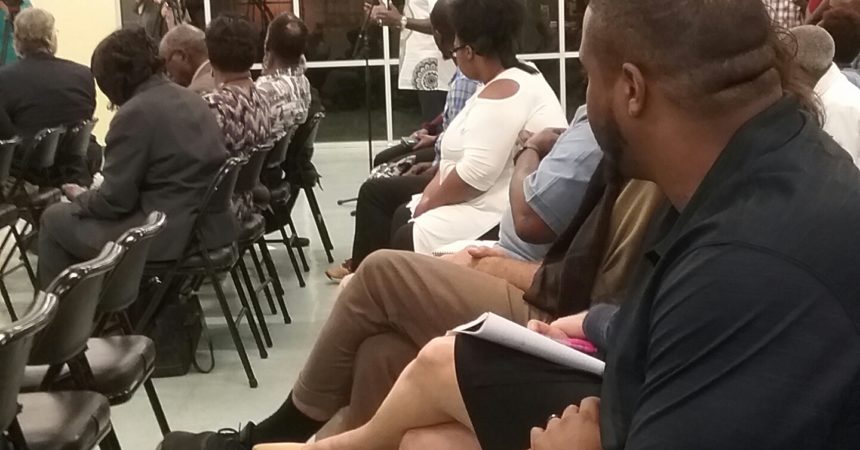
McNeil, community leaders want more action; not talk to help solve crime

Pastor Rudy Ferguson made an appeal to law enforcement officers to help reduce loitering in his community.
Photo by St. Clair Murraine
By St. Clair Murraine
Outlook staff writer
Everyone at a town hall meeting on crime had plenty of suggestions on how to solve the problem in Tallahassee.
Law enforcement officials, city leaders and community activists have heard most of what was said countless times in recent months in the wake of several shootings in the city.
Leon County Sheriff Walt McNeil couldn’t help but to make it clear Monday night that he’s heard enough already. It’s time to take action, McNeil said, seemingly frustrated about the number of recent meetings without any outcome other than the conversations.
The list of suggestions from several people in the pack Bethel Family Life Center included ways to get parents more involved in their children’s lives, starting entrepreneurial programs and providing good-paying jobs to get drug dealers off the streets.
“I heard those sentiments before; we are going to go forward and we never see that again,” McNeil said. “We have a list of things we need to do, but what’s the process.”
McNeil said he is putting several crime prevention programs in place and his staff is vigilant on crimes daily. As a result many of his staff is overworked in their efforts.
“We cannot keep this up,” he said. “Law enforcement can’t be everything to everybody.”
The nearly three-hour long meeting was moderated by former Tallahassee mayor Dot Inman Johnson, who served during a time when the crime rate in the city was much lower than it is today.
Tallahassee has the state’s highest crime rate for a third consecutive year.
Inman Johnson echoed McNeil’s sentiment that action has to come next instead of another round of discussions.
“If we leave here without a plan and somebody in-charge of that plan for pulling all of these things together and implementing … this will have done nothing tonight,” she said.
There are actually people like Talethia Edwards, a mother of seven children, who are taking action. However, she said she faces the same issue that was a resounding theme of parents not being engaged with the upbringing of their children.
Edwards, who lives in the Bond Community on Tallahassee’s Southside, gave statistics that show children in two schools in her neighborhood have a literacy of 29 percent. Those are some of the numbers that are used to build prisons, she said, turning to law enforcement officers on the panel for confirmation.
In her effort to find a solution, she is forming a leadership academy. However, she said request for applicants only got one parent.
“We’ve got a parent issue,” Edwards said. “Twenty-nine percent literacy rate and we know those statistics they are building prisons off of. But when we can’t get our parents to come to our leadership program it’s an issue. That’s a public safety issue.”
Darren Wallace, an assistant principal at Griffin Middle School, said he knows firsthand of the issue of absent parents.
“We don’t have a children problem, we have a family problem,” he said. “Our parents just don’t know how to complete the process of parenting.”
The panels included TPD chief Michael DeLeo, McNeil along with FAMU assistant police chief William Evers and David Perry, chief of FSU police department. Two other groups of speaker represented community based and several responders.
Pastor Rudy Ferguson spoke on behalf of the clergy community, calling for initiatives that would result in thriving communities.
“We have to start taking more proactive roles; take a non-traditional role to see how we become boots on the ground to really deal with the issues our young people are facing,” Ferguson said.
Many of speakers pleaded for a return to old-school values such as teaching young people how to develop industrial arts skills. That was one program that helped him stay in school, said Wallace, who admitted he could have easily chosen a life of crime.
Mentoring helped him and it could also be a solution, but there it has to be done with understanding of young people today.
“I got there by way of mentorship,” he said. “The Bobby Lang’s of the world. The Robert Mungen, the coach Tookes’; those old-school fellows that struggled.”
All of the coaches that he mentioned worked at FAMU when he attended college.
State attorney Jack Campbell, who wasn’t on the panel, said it will ultimately take community involvement to begin working to the kinds of action that McNeal and others would like to see.
“Tonight is a victory because we have all taken time to sit shoulder to shoulder and come together as a community,” Campbell said. “We as a community will solve these problems and make this the kind of place that we want to raise our children.”







